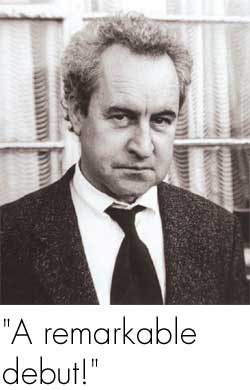“This should be a better world,” a science fiction convention attendee said. “A more honest one, where sex isn’t shameful or degrading. I wish this were the kind of world where you could say, ‘Wow, I’d like to sodomize you with my nightstick,’ and people would understand that it’s not a way of reducing you to an asshole and ignoring the rest of you, even though the request inherently objectifies the person you ask, but rather a way of saying that I may not know your mind, but your body is beautiful.”
We were standing in the hallway of ConStipation, about nine of us, three hadn’t had sex since the Twin Towers fell, and we all nodded. Then another friend spoke up.
“You can penetrate me,” he said to all of us in the hallway. “It’s no big deal.”
Now, you have to understand the way he said that, because it’s the key to the whole project. It was an Ayn Rand novel come to life. When dealing with a request along these lines, you have to completely ignore the meaning of the sentence in order to rationalize the manner in which you objectify someone. Consent is the important part of avoiding a sexual harassment lawsuit. You can tell your lawyer that you didn’t objectify the other person because they said yes. The spirit of everything was formed within those eight words. The Open Source Sodomy Project would have died had we not insisted that there was always a way to rationalize a request, to take the fun of seduction away, to simply pump my friend’s asshole right there in the hallway and ejaculate inside him.
Yet it wasn’t a come-on, either. There wasn’t that undertow of desperation because someone had said the sentence. When you skip out on hindsight, it’s always a marvelous thing. There was no promise of anything but a simple fuck.
We all dropped our pants in the hallway, our cocks erect and our friend quite willing to be part of our impromptu experiment. And lo, we all fucked our friend in the ass — taking turns to thrust, all of us coming. These were awesome asscheeks, plump but serviceable. And the sounds of all of us coming were beautiful. I understand that someone recorded all this and a podcast will be released soon.
And life seemed so much simpler.
It could have been base lechery. But in order for the Open Source Sodomy Project to work, we needed to flaunt our intellectual superiority, this quintessentially American way of justifying everything from looking at a complex moral dilemma with solipsistic naivete to stacking naked prisoners into a human pyramid and snapping pictures. There was always a reason. Always some excuse you could make to evade culpability. Now this wasn’t a case of only following orders, but of only following our desires. Innocence. We knew we couldn’t go further, but being allowed inside this area of somewhat restricted access with nothing more than a question was simply amazing.
We stood there afterwards, a little shocked, wondering if we should take some showers to get the smell of sex off of our bodies. Then someone else spoke in the same tone of voice.
“You can penetrate me, too!”
And my God! Many of us became hard and some of us exploded again! We weren’t degenerating into an orgy, but rather exploring the amazement of how beautiful the body was and how wonderful it was to have access to it. I should point out that those who requested sodomy only dropped their pants. They kept their tops on the whole time. Therefore, there was no objectification.
And every person in that hallway was then asked the question: “Can I penetrate you?” A few took offense and some of us were kicked in the nads. But some said yes. And the unfettered sex continued.
And my Lord, I’ve experienced sodomy in my time, but having so many sodomy opportunities in front of me was beautiful. We hadn’t even rented out a hotel suite! Who needed that when we could fuck anybody we wanted? And who needed to bother with getting to know a person? These were ripe assholes. Wondrous and mindless orifices to ejaculate into! We’d never consider sex with emotions again. We’d look at every person walking down the street and say to ourselves, “I wonder what it’s like to explode into his asshole! If he refuses, is he an asshole?”
We did not wish to offend. But one person we asked took offense when we asked to penetrate him. He was a large, muscular man who proceeded to beat the shit out of one of my friends after my friend posed the question. Something about assuming he was queer. We didn’t understand. Our friend’s in the hospital now. But, of course, he won’t be pressing charges. You simply don’t do that in an idealistic world. It’s like Esperanto. You believe in it no matter how problematic it is. Even though my friend was served with court papers and his attorney said that he’d require a five thousand dollar retainer. A small price to pay for the beauties of utopia!
By the end of the evening, others were coming up to us! Pretty soon, we were dropping our pants and there was more fucking.
I’ve left off the names, because frankly, people should reveal for themselves whether they’re Open Sourcers or not. People should speak out so that the natural spirit of evading the complexity of another person’s feelings can be sidestepped through this carnal simplicity. Who cares what the larger ramifications are? And who cares if an asshole is full of shit?
(Hat tip: Bookslut)
 Correspondent: Anna is actually a palindrome. Is that intentional?
Correspondent: Anna is actually a palindrome. Is that intentional?